by Stefano Giovanardi and Angelina Yershova
- Published: Tuesday, June 13 2017 19:14
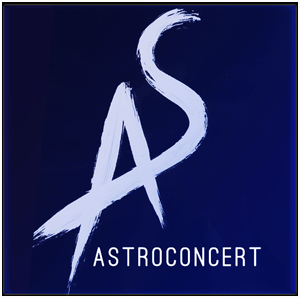 Dear friends, Stefano Giovanardi and Angelina Yershova are back to tell you about the most recent production of the Astroconcert project. You may agree with us that the sight of the Northern Lights that inspired “Aurora Borealis” could easily be labeled among the most magnificent sights the sky can offer to a human eye. Likewise, the apparition of a comet can sometimes produce a similar, longstanding impression: any passionate skywatcher will never be able to forget the magic beauty of memorable comets like Hyakutake, Hale Bopp and Mc Naught. Add to a comet’s legendary charme the thrill that was spread worldwide by the Rosetta mission and you will understand why in 2015 comets became the subject of our Astroconcert “Icy Rose 67P”.
Dear friends, Stefano Giovanardi and Angelina Yershova are back to tell you about the most recent production of the Astroconcert project. You may agree with us that the sight of the Northern Lights that inspired “Aurora Borealis” could easily be labeled among the most magnificent sights the sky can offer to a human eye. Likewise, the apparition of a comet can sometimes produce a similar, longstanding impression: any passionate skywatcher will never be able to forget the magic beauty of memorable comets like Hyakutake, Hale Bopp and Mc Naught. Add to a comet’s legendary charme the thrill that was spread worldwide by the Rosetta mission and you will understand why in 2015 comets became the subject of our Astroconcert “Icy Rose 67P”.
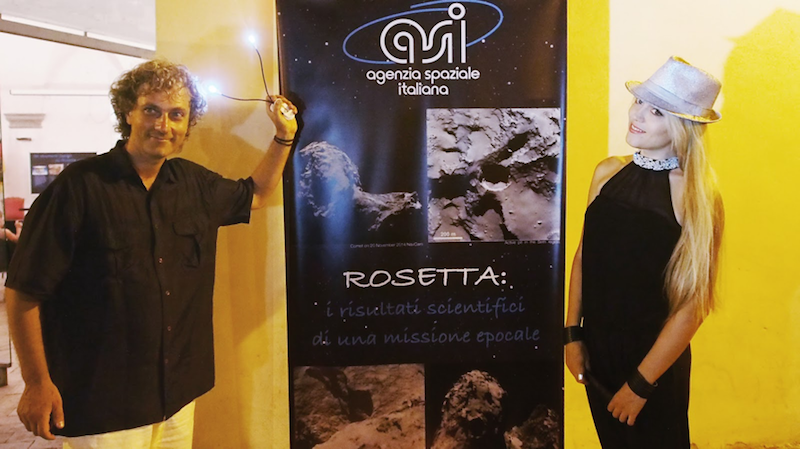
Perhaps the highest achievement of our artistic research comes, as regards the fine tuning of Astroconcert’s musical storytelling formula, with “Icy Rose 67P”, composed upon invitation by Astronomers Without Borders for the Global Astronomy Month 2015 (here is the teaser for the event). Icy Rose 67P is dedicated to comets and in particular to the Rosetta mission, that captivated the imagination of people all around the world. Our idea was to take a personal trip to comet 67P/Churyumov-Gerasimenko, flying along with Rosetta to tell the story of the mission and its scientific results, but also framing it within a personal perspective by connecting the revolutionary knowledge about comets delivered by Rosetta to our genuine image of a comet, as a fuzzy “star with a tail” moving across the sky. This is why Icy Rose 67P begins with memories of old comets observed by Stefano since his boyhood, documented by sorting out childish drawings and old analogic photos of “historical” apparitions like Halley’s in 1986, Hyakutake in 1996, Hale-Bopp one year later until McNaught in 2006.
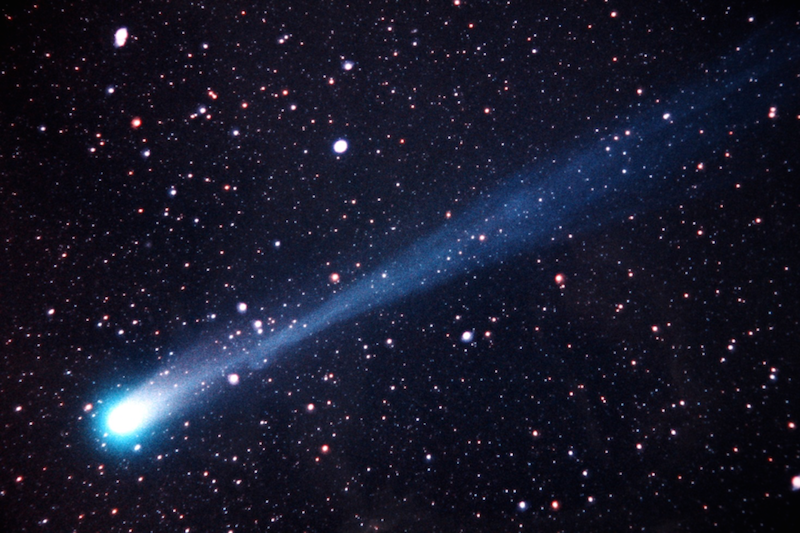
The unforgettable comet Hyakutake photographed by Stefano in 1996. He recalls it as one of the three most beautiful things he saw in the sky.
The striking contrast between/Comparing the naïve representation of a comet that we all had in mind before Rosetta and/to the actual look and shape of comet 67P is the common ground upon which “Icy Rose 67P” unfolds its story. The concert is divided into eight chapters, leading step by step to play with the popular concept of “comet”. This is why the Rosetta mission is described “backwards”, from the end (more precisely from Philae’s landing) to the beginning (the launch of Rosetta in 2004). In fact, we first present the celebrated selfie released by Philae once it stopped on the comet surface right at the start of the second track, in order to produce the most striking contrast with the familiar look of comets in the sky, just described before. From there, the concert moves on: basically, it flies “upstream” along the entire trajectory of Rosetta, from the comet back to its launch pad on Earth. In other words, this is how we try to reconcile the two extremes: as we slowly fly back to our planet, we rewind our knowledge of comets, reconnecting new discoveries with ancient imagination.
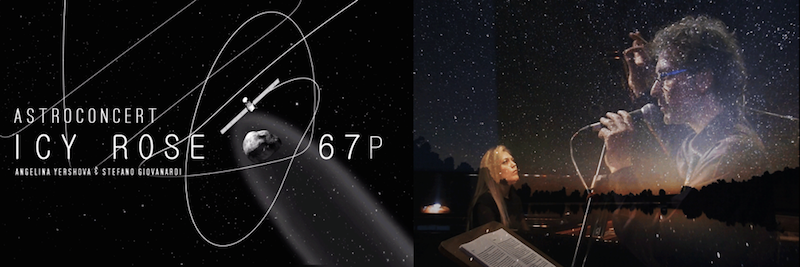
In the 4th chapter there is room for a zoom on the sophisticated technology installed on board of Rosetta, that allowed the probe to analyze the comet in every detail: the focus is perfectly solved by animating with electronic effects and sharp rhythmic impulses the graphical animations by ESA showing the array of instruments operating on Rosetta. The perfect synchronicity between the animation and Angelina’s music results in attributing a proper “sound” to the motion of the graphical elements in the video, creating what is perhaps the best example of synesthesia in our Astroconcerts. We find this solution particularly beautiful and appropriate because it brings effectively the attention to the technical features of Rosetta, without drifting too much into a complicated description of the instruments, that would be beyond the purpose of the concert. Instead, we use this passage to drift toward a new, suggestive idea of how a comet can be portrayed in our mind – a metaphor that combines Rosetta’s thorough portrait of comet 67P with previous imagination: that is the “Icy Rose”, hence the name of the entire Astroconcert.
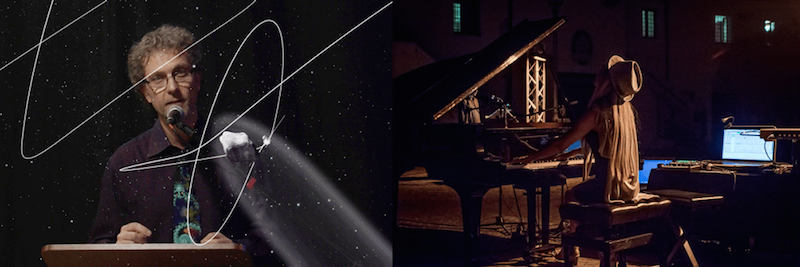
It is fair to say that our genuine surprise before the edgy and irregular landscape of comet 67P comes from the fact that we approach this discovery not only with the rationality that allowed scientists to send Rosetta and Philae to the comet, but also with ancient roots that are lost deep in a history full of superstitions about comets: this dual feeling that we carry inside is the intuitive key upon which the final chapters of “Icy Rose 67P” are written: Cryptocomet – delving into ominous stories regarding the apparition of comets -, Ellipses – calculating the orbits of comets and following them to understand their origins, and finally De Sidera, a warm reconciliation between us and the sky, that reminds us how comets – considered for long the evil beasts of mankind - come back to fly with our best wishes in the form of shooting stars.
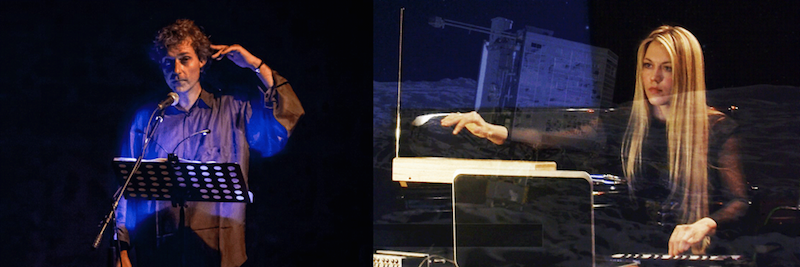
It is remarkable that throughout the entire concert Angelina’s music dialogues with the words, flowing and sharing the volumes in a harmonic way so that every pause of the speech becomes space for the sounds. This is possible thanks to the high rate of improvisation that builds upon the solid structure of the show. In order to achieve such a plastic symbiosis between the sound “palette” used by Angelina and the vibrations of Stefano’s voice we analyzed the overlapping auditory spectrum so that both elements can co-exist within a frame of changing timbres and dynamics. The final result surprised us, indeed! Even from our perspective on stage, a performance of Icy Rose 67P gives out dense emotions and catches us in a captivating mood as it flows, chapter by chapter. Unlike all the previous Astroconcerts, Icy Rose 67P was written in English (and only later translated into Italian) and went online in streaming during the Global Astronomy Month 2015. Here is a compilation of a few “glimpses” from that performance.
Unfortunately, “Icy Rose 67P” could never be performed at the Planetarium of Rome, because by the time we composed it the Planetarium and Astronomical Museum had already been closed to the public. We are still wondering whether this shameful and unnecessary shutdown will ever come to an end, and if the celebrated Planetarium will be reopened at all (spoiler: the maintenance works to the Museum of Roman Civilization have not even started yet… more than three years after the closing!). For this reason, our latest Astroconcert has been performed only in frontal settings, on stage, in studio or in the open air, like at the event “A Testa in su – le stelle e lo spazio” organized by ASI in Cerveteri 2015, or the Space Up un-conference in Rome. Here is a clip from the performance in Cerveteri.
Now, what comes after Icy Rose 67P? What’s next? Well, we don’t certainly lack good ideas for new productions: the themes available are virtually infinite, and the flow of the most recent astronomical news easily provides great suggestions. In fact, we have been already considering composing new astroconcerts on gravitational waves, or Pluto and the dwarf planets, and again extrasolar planets – a real favorite topic of Stefano’s. We are actually open also to your requests and suggestions: what would you like as the next Astroconcert? Let’s open the poll here: feel free to send in your suggestion. Ok, we cannot compose a whole new concert à la carte, because it requires quite a lot of work, but we are really interested in knowing what our fans would like from us.
You can send an email at [email protected] or check our website www.astroconcert.com and follow us facebook and twitter. Samples taken from our performances are published on our YouTube channel Astroconcert.
We’ll continue our artistic residency here on the AstroArts blog until the end of June, talking about our independent projects: musical ones for Angelina, astronomy related for Stefano. As it usually happens in the middle of a concert, we take a short break but we will be back soon!








Comments